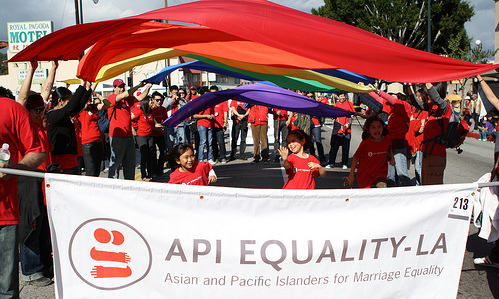Photo by API Equality-LA
“May God have mercy on this falling land!” proclaimed Chinese actress Lu Li Ping in 2011, “We have to prevent this from happening in China.”
Ping was reacting to New York state’s passing of legislation that legalized same-sex marriage in the state, a policy that is hardly on the horizon in the Asian country that is largely homophobic and unwelcoming to queer citizens. But, as Visiting Assistant Professor Alvin Wong discussed in his talk “Queer Theory and Chinese Modernity” on February 19th, there are some forms of culture which push against the largely heterosexist society and offer signs of hope for the future.
Wong pointed out that, while there are not many explicit representations of LGBTQ Chinese people in the nation’s literature and media, some have created works which “queer” love in various ways.
In the novel “Private Life,” a female protagonist in the 1960s chooses to live a solitary life and is treated by psychologists who declare her to be insane. While this woman may not identify as a lesbian, she is making a non-normative choice to not settle down with anyone—which implies that she may be a part of the asexual community. Importantly, she is portrayed in a positive light and the forces working against her are seen as vices; this is a rare show of support for someone who does not fit into the “traditional” Chinese lifestyle.
In one story in the work “She’s a Woman, I’m Also a Woman,” a woman who has a rocky relationship with her mother dreams of meeting a lesbian lover in a bar who she later realizes is her own mother. This Freudian scenario presents an incestal same-sex relationship, which both contributes to the idea that queer relationships are shameful and acknowledges that two women can meet and fall in love.
Professor Wong highlighted the power that new forms of online media may have for queer Chinese people to express themselves and challenge the homophobia they experience. While popular media may treat same-sex loving people as strange abberations, these people themselves will hopefully find ways to change the conversation into a more positive direction. Maybe someday legislation that benefits queer people will not be seen as a problem China needs to avoid, but an improvement that will contribute to the world’s largest country.


